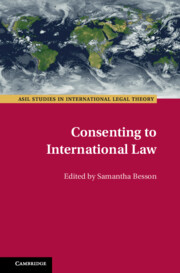Book contents
- Consenting to International Law
- ASIL Studies in International Legal Theory
- Consenting to International Law
- Copyright page
- Contents
- Contributors
- Preface
- Consenting to International Law
- Part I Notions and Roles of Consent
- Part II Objects and Types of Consent
- 6 Do International Agreements Have a Consent Problem?
- 7 Consenting to Treaty Commitments
- 8 State Consent in the Evolving Climate Regime
- 9 Consent and Sources
- 10 Variations around the Notion of Consent in Investment Arbitration
- Part III Subjects and Institutions of Consent
- Index
6 - Do International Agreements Have a Consent Problem?
from Part II - Objects and Types of Consent
Published online by Cambridge University Press: 23 November 2023
- Consenting to International Law
- ASIL Studies in International Legal Theory
- Consenting to International Law
- Copyright page
- Contents
- Contributors
- Preface
- Consenting to International Law
- Part I Notions and Roles of Consent
- Part II Objects and Types of Consent
- 6 Do International Agreements Have a Consent Problem?
- 7 Consenting to Treaty Commitments
- 8 State Consent in the Evolving Climate Regime
- 9 Consent and Sources
- 10 Variations around the Notion of Consent in Investment Arbitration
- Part III Subjects and Institutions of Consent
- Index
Summary
The author explores how consent functions as commitment, content, and constitution for international agreements. He argues that consent constructs all forms of international commitment. Consent elucidates an agreement’s contents – what the agreement ‘is’ in terms of scope and substance. Consent can also function as a constitution – delimiting not only ‘primary’ rules encapsulated by an agreement’s existence and contents, but ‘secondary rules’ determining who can make agreements, how they must do so, and ways to recognize, adjust, and end them. For all these functions, consent remains an under-examined and undifferentiated concept. Today, almost any of consent’s functions can be established by almost any formal or informal means. Alongside existing proposals (presumptions/defaults and content-based criteria), this chapter proposes that international law should pursue more – and different – formalities for consent. Having different forms of consent follow its different functions may, according to the author, improve the efficacy of consent and with it the efficacy of international agreements overall.
Keywords
- Type
- Chapter
- Information
- Consenting to International Law , pp. 137 - 162Publisher: Cambridge University PressPrint publication year: 2023

